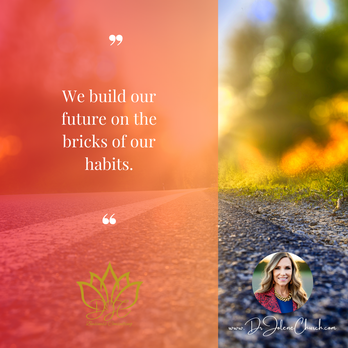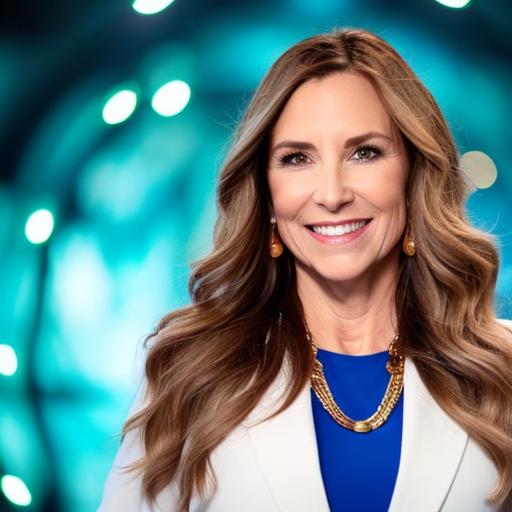|
10/22/2023 0 Comments The Clarity of Mindset "Your mindset is the lens through which you see the world. How clear is yours?" In every corner of our lives, from the morning's first light to the night's deepest dreams, our mindset is the silent influencer, molding our perception and guiding our reactions. Like a photographer choosing a lens to capture a scene, our mindset frames our view of the world. But what happens when that lens is smudged or fogged by external influences? A Journey through the Filtered Glass As we navigate the myriad experiences life offers, our mindset accumulates layers—each one formed from past traumas, societal conditioning, limiting beliefs, and even fleeting encounters that leave lasting imprints. These layers, like dust on a camera's lens, can skew our perspective, making us perceive challenges as insurmountable barriers and casting shadows over potential joys. The Power of Clear Perception But, imagine a world where our mindset lens is not just clean but crystal clear. Such a mindset doesn't just perceive things accurately; it envisions opportunities even in adversity. It sees a setback not as a stumbling block but as a stepping stone, a chance not only for recovery but for growth. This kind of clarity fosters resilience. When setbacks emerge, a clear mindset pivots and adapts, seeking solutions instead of wallowing in despair. It engenders optimism, allowing us to move forward with hope and purpose, even when the path ahead seems clouded. Polishing the Lens Achieving and maintaining a clear mindset requires dedicated effort. It demands that we periodically pause to introspect, evaluating the beliefs we hold and the narratives we subscribe to. Are they truly reflective of who we are and the reality around us? Or have they been clouded by external opinions and unfounded fears? By actively challenging our biases and seeking diverse perspectives, we can start to clear away the smudges on our mindset lens. Embracing lifelong learning and surrounding ourselves with a range of voices and experiences can further hone our clarity. Into a World of Clear Vision In the end, the clarity of our mindset determines the richness of our experiences. A clear lens allows us to see the world in its vibrant colors, intricate details, and boundless possibilities. So, as you move through life, periodically ask yourself: How clear is your lens? And remember, with every moment of introspection and every challenged belief, you're not just cleaning your lens but crafting a richer, clearer, and more vibrant view of the world.
0 Comments
10/20/2023 0 Comments Beyond Illusions, Into Reality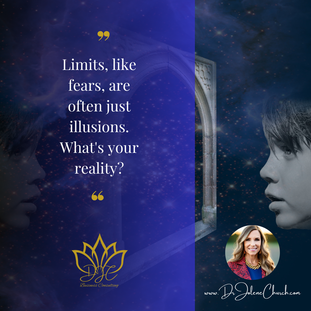 Deciphering Our Self-Imposed Limits In the vast beauty of our existence, there are lines, shadows, and colors. Some of these are vivid strokes of reality, while others are mere smudges of illusions. Among the most profound of these illusions are the boundaries we believe confine us. They act as walls, blocking us from our potential, from dreams un-chased and horizons unseen. But how often do we pause and wonder if these walls are real or merely constructs of our imagination? The Birth of Illusions Most limits we perceive aren't borne from an objective reality but are instead a culmination of past experiences, societal dictates, or internal fears. A failed venture might instill a fear of risk-taking. A criticism in youth could germinate a lifetime of self-doubt. These instances, often innocuous at the moment, can snowball into seemingly insurmountable walls in our minds. But are these walls tangible or simply mirages reflecting our insecurities? The Journey of Introspection To distinguish between genuine limits and mere illusions, introspection is crucial. It allows us to trace back our beliefs, understanding their origins and assessing their current relevance. A fear born from a childhood event might no longer hold water in the matured landscape of our adult life. This journey inward is not just about identifying the illusions but also understanding their power over us. Recognizing that a limit is self-imposed is the first step to dismantling it. Confronting the Mirages Having identified these illusory boundaries, the next step is to confront them. This confrontation is less about battle and more about understanding. Why does this particular fear exist? Is it guarding us from genuine harm, or is it an outdated defense mechanism? Often, merely questioning these illusions diminishes their power, revealing them for the phantoms they are. Crafting a Boundless Reality Once we start piercing through these illusions, a new reality emerges—one where possibilities are vast, and the horizons stretch infinitely. Every time we shatter an illusory limit, we don't just prove our capabilities; we redefine what's possible for us. This new paradigm, unshackled from unfounded fears and beliefs, is where genuine growth and exploration reside. While the world around us might have its physical boundaries, the limits of our mind need not be set in stone. By distinguishing between reality and illusion, we can craft a life where our potential is not confined by imaginary walls but is instead boundless, vibrant, and ever-expanding. 10/18/2023 0 Comments The Winds of Change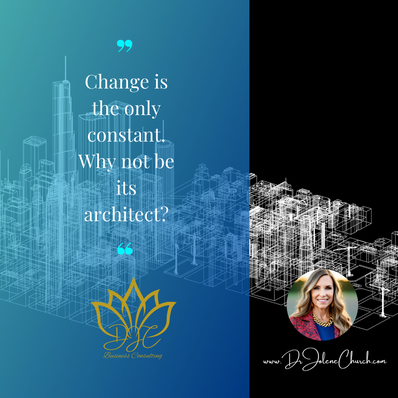 "Change is the only constant. Why not be its architect?" In the sprawling landscape of life, there's a perennial force that remains ever-present: change. Like the wind, it is intangible, unpredictable, and pervasive. It ruffles our routines, turns the pages of our plans, and reshapes our realities. But while many see change as a gust that nudges them in directions beyond their control, there's an empowering perspective waiting to be embraced: seeing oneself as the crafter of these winds. Understanding the Winds and Their Power The first step in harnessing the power of change is recognizing its inevitability. Much like the seasons, change is a natural cycle of life. Trends shift, relationships evolve, personal growth happens, and sometimes, unexpected challenges arise. By understanding that change is a constant companion, we can move from a stance of apprehension to one of anticipation. The Proactive Approach: From Passenger to Pilot Merely acknowledging change isn't enough; it's how we respond that defines our experiences. Many of us tend to be passengers in our own lives, letting the winds of change steer our course. But imagine the empowerment in grabbing the wheel and directing those winds. Being proactive means recognizing potential changes on the horizon, understanding their implications, and then actively shaping how they affect our lives. Instead of waiting for change to dictate the next chapter, it's about writing it ourselves. Crafting Your Path Forward How does one become the architect of change in their own life? It begins with introspection. Understand what you value, where you see yourself in the future, and how you'd like to grow. With this vision in hand, assess the changes around you. Are there upcoming shifts in your career, personal life, or environment? How can these be aligned with your vision? For instance, if a job change is on the horizon, consider how it fits into your broader career aspirations. If personal growth or learning is a goal, how might you proactively immerse yourself in new experiences or education? Embracing Change as an Opportunity Finally, it's essential to shift our mindset about change. Instead of viewing it as a disruptive force, see it as a canvas—a blank slate waiting for your brushstrokes. Each change presents opportunities for growth, learning, and transformation. By being its architect, you get to decide the colors, shapes, and patterns. The winds of change are always blowing. But whether they lead to storms or clear skies largely depends on our approach. By becoming proactive architects of change, we not only navigate life's challenges more effectively but also craft a journey that's uniquely ours, filled with purpose, passion, and personal growth. 10/17/2023 0 Comments The Majesty of Life's Mountains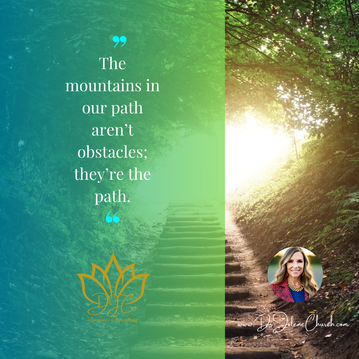 "The mountains in our path aren’t obstacles; they’re the path." Life is a journey characterized by its undulating paths, filled with valleys of comfort and peaks of challenges. While many of us fantasize about smooth plains leading straight to our goals, more often than not, we encounter mountains. And these mountains, contrary to our initial trepidation, are not merely obstructions; they are integral parts of our journey, shaping its very essence. Mountains as Life’s True Teachers When we think of mountains, we often think of challenges, of steep climbs, and exhausting treks. But what if we reframe this perspective? What if, instead of viewing them as barriers, we recognize them as the universe's most poignant classrooms? Every step up a mountain teaches us about patience, resilience, and the beauty of perseverance. Each climb, no matter how strenuous, ingrains in us lessons of tenacity and grit. With every ascent, we not only move closer to the peak but also delve deeper into our reservoir of inner strength, discovering facets of ourselves we might have otherwise overlooked. The Reward Awaits at the Summit Beyond the lessons, the real magic of the mountains lies in the rewards they offer. Not in materialistic terms, but in experiences and views that remain etched in our souls forever. From the summit, we gain panoramic perspectives on how far we've come and the vast horizons that await. It's a vantage point that both humbles and elevates, reminding us of our journey's worth and the potential of the paths still untraveled. Embracing the Journey, One Step at a Time So, the next time life presents a mountain, instead of seeking shortcuts or easier routes, let's embrace the ascent. Let's remember that the climb, with all its challenges, is also where the magic happens. It's where we grow, evolve, and truly come into our own. The mountains in our life, whether they symbolize personal challenges, professional hurdles, or emotional growth, are not mere obstacles. They are the very essence of our journey, promising not just trials but also unparalleled triumphs. By embracing these peaks and valleys, we chart a course not just of success, but of profound personal evolution. When we gaze upon the skyline, we are greeted by towering skyscrapers and sprawling buildings that command attention and awe. Yet, each of these grand constructs began with something foundational and seemingly mundane: a single brick. This principle applies directly to our lives. The maxim, "We build our future on the bricks of our habits," carries a profound truth. Our daily actions, choices, and routines are the bricks that make up the edifice of our existence. Each habit, whether minuscule or monumental, plays a part in shaping the trajectory of our lives.
10/15/2023 0 Comments Courage in Inquiry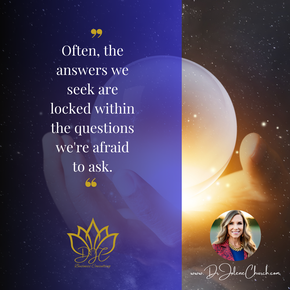 Venturing Beyond the Familiar "Often, the answers we seek are locked within the questions we're afraid to ask." In our quest for understanding and enlightenment, questions play an indispensable role. They serve as the portals through which we gain deeper insights, challenge our beliefs, and navigate the intricacies of the world around us. But amidst this plethora of inquiries, certain questions loom larger and more daunting than others. These are the questions we often avoid or delay asking, not because of a lack of curiosity, but due to the trepidation they invoke. The Weight of the Unasked Why do some questions carry such weight? Why do we shy away from them even when we know they might hold the answers we seek? The reasons can be multifold. For some, it's the fear of unearthing an unsettling truth. For others, it might be the potential of having to re-evaluate long-held beliefs. Then there's the vast, often intimidating expanse of the unknown – the unpredictable implications that come with certain answers. However, by not asking these questions, we are essentially choosing to remain in the shadows of our understanding. We are opting for the safety of the known, even when it might be flawed or incomplete. The Power of the Posed Question There is unparalleled liberation in giving voice to our most profound uncertainties. As daunting as it may seem, there's an inherent courage in inquiry. When we muster the strength to ask the challenging questions, we're not just seeking answers; we're asserting our commitment to personal growth and understanding. Behind each intimidating question is a chance for growth. It's an opportunity to peel back layers of preconceived notions, biases, and misconceptions. And often, once the question is voiced, the answer, or at least the path to it, becomes much clearer than we could have imagined. Embracing the Journey of Inquiry Today, and every day, it's worth reflecting on the inquiries we've pushed to the back of our minds. What are we afraid of uncovering? Why do these questions make us so uncomfortable? Delving into these hesitations can itself be a revealing exercise, shedding light on our values, fears, and aspirations. Once we confront and understand our reservations, we can approach these questions with a newfound courage. The act of asking, then, becomes not just a search for answers but a testament to our dedication to personal evolution. Our journey through life is punctuated by countless questions. But it's the ones we're hesitant to ask that often hold the most transformative potential. By embracing the courage in inquiry, we can unlock deeper dimensions of understanding and truly venture beyond the familiar. Be bold. Embrace the power of inquiry! 10/14/2023 0 Comments Taking the Pen of Your Day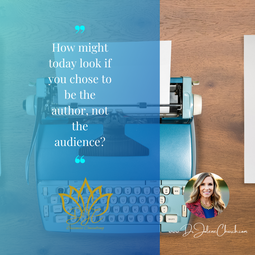 "How might today look if you chose to be the author, not the audience?" Each day presents a blank page, waiting to be filled with our actions, choices, and narratives. While it's comfortable to sit back and let life unfold as a passive spectator, there's unparalleled empowerment in seizing the pen and scripting our own journey. Being the author means taking agency, shaping the narrative, and deliberately choosing our path. It's about recognizing that we aren't mere recipients of external circumstances but active creators of our destiny. As the audience, we react; as authors, we act. Imagine the possibilities that open up when you approach challenges not as unchangeable plot twists but as malleable story arcs you can influence. Envision the freedom in viewing setbacks not as endings but as tension-building moments leading to new chapters. If you were to write today, what story would you pen? Would it be one of resilience, innovation, love, or adventure? Remember, every choice, every interaction, and every thought adds a line to your narrative. Start today with intention, courage, and creativity. Take charge of your storyline and watch as you transform from a spectator to a protagonist in the epic tale of your life. #DrJoleneChurch #BeTheAuthor ✍️🌟 10/11/2023 0 Comments Turning Setbacks into Success Stories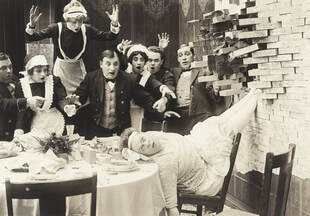 In the grand, ever-changing landscape of life, there's a peculiar creature we've all encountered. It's called a 'setback'. Sometimes disguised as a challenge, a mistake, or an unexpected twist, these events often wear a cloak of negativity. But what if we were to tell you that this cloak is merely an illusion? What if setbacks are not nefarious fiends, but playful muses that invite us to dance? Welcome to the world of the Opportunity Mindset! The Tale of Two Perspectives Imagine two characters: Mr. Setback-Sigh and Ms. Opportunity-Oh! Both face the same challenge. Mr. Setback-Sigh groans, laments his luck, and wishes things were different. On the other hand, Ms. Opportunity-Oh! tilts her head, grins, and thinks, "Hmm, what can I learn from this?" Which camp do you often find yourself in? There's no shame in sometimes being a Mr. Setback-Sigh, but it's Ms. Opportunity-Oh!'s perspective that can truly transform your life's narrative. Reframing the Game To understand the Opportunity Mindset, imagine life as a playful video game. Every setback is not a "game over" but a new level with hidden treasures waiting to be discovered. And guess what? You're the main character, armed with the power of choice. When faced with a setback, ask:
The Ultimate Teachers Now in this game of life, where we often hope for a seamless gathering filled with predictable joys and celebrations, setbacks saunter in like those uninvited guests, seemingly disrupting our well-laid plans. However, upon closer interaction, these gatecrashers might just hold the most intriguing tales and the most profound lessons of the evening. Think of setbacks not as party poopers but as mysterious guests with cryptic messages. They don't announce their arrival with polite RSVPs or come bearing conventional gifts; rather, they weave silent lessons into the lively chatter of our experiences. Through them, we're coaxed into a corner, asked to think critically, challenge our comfort zones, and engage in reflective dialogues. It's akin to discovering that the most unexpected guest at the party is, in fact, a wise sage in disguise, offering insights we didn't even know we sought. Life, with all its ebbs and flows, is like an ever-evolving soiree. Setbacks are those moments when the music skips or the lights flicker. Every hiccup, every pause gives us a chance to recalibrate, to choose a new dance or strike up a fresh conversation. Rather than bemoaning the interruption, we can find a new rhythm, embrace a different dance partner, or even unearth a revelation that had been previously overlooked. Moreover, just as no two party guests share the exact same story, setbacks have a personal touch, tailoring their teachings to each individual. It's as if these unexpected guests pull us aside, whispering tailored tales that ensure we confront and cherish facets of ourselves that are ripe for growth and reflection. Imagine our emotional and mental fortitude as the party's ambiance. Just as playing the same song on loop would lead to a dull atmosphere, a life without its share of unexpected guests would leave our inner growth stunted. These challenges, with their surprising entrances and exits, add layers to our stories, enhancing our resilience and enriching our narratives. Lastly, let's acknowledge the innovation that setbacks can inspire. Many a time, the most profound revelations, or the most memorable moments of a gathering, arise from the unplanned, the unexpected. Similarly, history brims with tales of pioneers whose groundbreaking ideas were birthed from challenges they hadn’t anticipated but brilliantly embraced. When we welcome setbacks as intriguing guests rather than uninvited nuisances, our perspective shifts. Instead of a sense of dread, we feel an eagerness, a curiosity. Each unexpected turn becomes an integral chapter in our ongoing saga. So, the next time life introduces an unexpected guest, extend your hand, lean in, and listen closely to the tales they tell. Let's appreciate these extravagant party guests in their various forms. Some are familiar faces, routines and joys we can predict, while others are the unexpected party crashers. They seem to disrupt the rhythm of our dance, but when we treat begin to treat this dance, not as a strict choreography but as an exciting game, things change. Uninvited guests are merely presenting us with new levels to conquer, urging us to embrace the Opportunity Mindset. Here's how we can do just that!
So next time life, in its unpredictable manner, introduces a plot twist or a surprise level, imagine the contrasting energies of Mr. Setback-Sigh, who resists the change, and Ms. Opportunity-Oh!, who welcomes it with open arms and nimble feet. Whose energy will you channel? So, as the music changes and the game levels up, dance with the setbacks, find joy in the challenges, and always remember: every 'game over' is merely an invite to restart with newfound wisdom and zest. With every move and every step, you're not just attending life's party; you're mastering its playful dance. Dive into the vibrant, ever-evolving gala of the Opportunity Mindset! 🌟🕺🎮 10/11/2023 0 Comments Beyond the Comforting Confines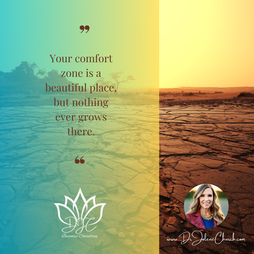 "Your comfort zone is a beautiful place, but nothing ever grows there." The comfort zone, with its familiar surroundings and predictable outcomes, offers a sanctuary of safety. It's a space where risks are minimal, routines are established, and the waters are calm. But while it promises comfort, it also holds a subtle trap—stagnation. Growth, by its very nature, is about venturing into the unknown. It's about facing challenges, navigating uncertainties, and embracing change. The richest experiences, the most profound lessons, and the most transformative moments often lie just beyond the edges of our comfort zones. Imagine a seed, nestled safely in its packet. While it's protected and preserved, it's only when planted in the soil, exposed to the elements, that it truly starts its journey towards becoming a mighty tree. Every time you step outside your comfort zone, you're sowing seeds for your future self. You're inviting new experiences, learning, and evolving. The initial steps might be daunting, but they pave the path for incredible growth. Today, ask yourself: Where are you holding back out of comfort? What opportunities await you just beyond those familiar boundaries? Dive into the unknown, and watch as your growth story unfolds. #DrJoleneChurch #BeyondComfort 🌱🚀 10/11/2023 0 Comments Finding Rhythm in the Rain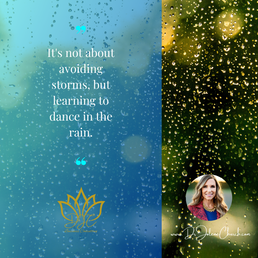 "It's not about avoiding storms, but learning to dance in the rain." Life's unpredictability is one of its most consistent attributes. Storms, both metaphorical and literal, are inevitable. While our first instinct might be to seek shelter, to avoid the discomfort and uncertainty, there's profound beauty and growth in choosing a different response. Dancing in the rain isn't just about facing adversity head-on; it's about finding joy, rhythm, and grace amidst the chaos. It's about embracing life's downpours as opportunities to grow, to learn, and to celebrate the transient nature of our experiences. When we dance in the rain, we're not denying the storm's existence or its power. Instead, we're asserting our resilience, our ability to find hope in the gloomiest moments, and our innate human capacity to adapt and thrive. Every drop that touches us can be a reminder of our strength, our tenacity, and our spirit. The storms, no matter how fierce, eventually pass, but the lessons and the dances? They stay with us, shaping our souls and weaving into our life stories. Next time you're caught in life's tempests, remember you have a choice. Will you merely endure the storm, or will you dance, leaving behind footprints of joy and resilience? #DrJoleneChurch #DanceInTheRain ☔💃 10/11/2023 0 Comments Embracing the Lessons of the Universe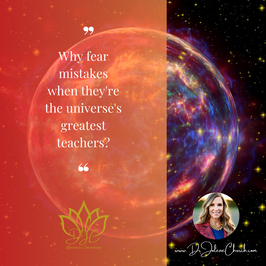 "Why fear mistakes when they're the universe's greatest teachers?" Mistakes, missteps, miscalculations - society has trained us to view these as setbacks, as something negative. We wear them as invisible badges of shame, allowing them to define our worth or dictate our potential. But what if we've been looking at them all wrong? The universe, in its infinite wisdom, doesn't operate on the binary principles of right and wrong. It flows, evolves, and grows. In this grand tapestry, mistakes aren't errors; they're lessons in disguise. They're opportunities for growth, for understanding, for resilience. Every time we stumble, we're presented with a unique chance to learn - about ourselves, our environment, and our journey. It's in these moments of vulnerability that our true strength shines, where our character is both tested and forged. So, instead of shying away from mistakes, embrace them. Delve deep into their teachings, understand their messages, and use them as stepping stones. By shifting our perspective from fear to curiosity, from avoidance to acceptance, we open ourselves to the universe's vast reservoir of wisdom. Remember, stars can't shine without a bit of darkness. Similarly, our brightest moments often emerge from our most challenging lessons. How are you choosing to embrace your mistakes today? #DrJoleneChurch #LessonsFromTheUniverse 🌌💡 10/10/2023 0 Comments The Journey of Discipline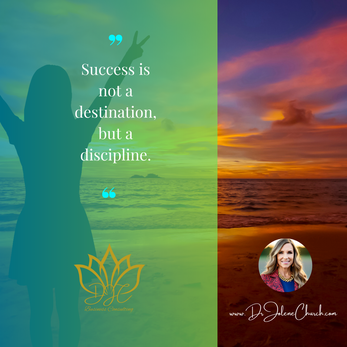 "Success is not a destination, but a discipline." In our pursuit of success, we often visualize it as a mountaintop, a pinnacle of achievement that, once reached, signifies the culmination of our journey. But what if success is less about the destination and more about the path we carve, the habits we cultivate, and the discipline we uphold? Think of success as a continuous journey where discipline is the compass guiding our steps. It's the daily rituals, the choices we make in the face of adversity, and the persistence to stick to our values, even when the going gets tough. Discipline is waking up each day with purpose and passion, even when the sparkle of motivation dims. Moreover, defining success as a destination can lead to fleeting satisfaction. We reach one milestone, only to realize there's another peak ahead. But when we understand success as a discipline, every step, every hurdle crossed, and every lesson learned becomes a celebratory moment. The process becomes as rewarding, if not more so, than the end goal. As you continue on your journey, rather than solely focusing on the horizon ahead, take a moment to recognize the beauty in your strides, the resilience in your spirit, and the discipline that fuels your journey. Success, then, becomes a living, breathing entity, interwoven into the fabric of your daily life. Where are you allowing discipline to shape your path today? #DrJoleneChurch #JourneyOfDiscipline 🧭🌟 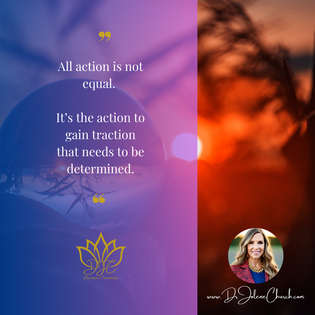 "All action is not equal." A phrase so simple, yet deeply profound. In the age of information, where the internet, books, and countless resources are at our fingertips, it's effortless to become trapped in a cycle of perpetual 'learning'. We can spend hours, days, even years, consuming knowledge, thinking that we are taking meaningful action. But is this movement or is it progress? Imagine two runners. One is running on a treadmill, clocking miles without ever moving from his starting spot. The other is on a track, each step taking him closer to a finish line. Both are exerting effort, both are 'in action'. But only one is actually getting somewhere. It's crucial to discern between motion and progress. Motion keeps you busy. It gives you the illusion of productivity. It's reading another article, watching another seminar, or attending another meeting. But progress, on the other hand, is tangible. It's the application of what you've learned, the steps you take that lead to a change, an outcome, a result. The wisdom lies not in the amount of knowledge you consume, but in your ability to sift through that vast ocean of information and pick out the actionable insights that will truly "move the needle". It's about identifying and executing the high-leverage tasks that lead to exponential outcomes. So, the next time you find yourself "taking action", pause and ask: "Is this action getting me traction? Or am I just running in place?" Because while all action is commendable, it's the direction and purpose behind it that determines the magnitude of its impact. #MotionOrProgress #DrJoleneChurch #BusinessStrategistCoach  At the core of our being, humans have always been social creatures. Our ancestors thrived and survived in tight-knit communities where collective effort was the key to overcoming challenges. Being accepted within these communities wasn't just about feeling good—it was often a matter of life and death. Those who were ostracized faced the stark realities of isolation, lack of protection, and diminished resources. As a result, an innate desire to fit in and belong has been hardwired into our very DNA. With time, while the threats of old have largely dissipated, the evolutionary remnants of this fear remain. The modern world, with its intricate web of social interactions and the magnifying effect of social media, constantly triggers these deep-seated fears. We find ourselves perpetually concerned about fitting into societal molds, fearing the metaphorical 'exile' that comes from being different or not meeting perceived standards. It's this historical and evolutionary background that makes the opinions and judgments of others feel so weighty in our lives. The High Costs of People Pleasing In our contemporary era, where perceptions can seemingly make or break personal and professional relationships, many find themselves inadvertently ensnared in the trap of people pleasing. This seemingly innocuous desire to be liked and approved of carries with it a weighty toll. For starters, when we're constantly tailoring our actions and beliefs to align with what we think others expect of us, we risk eroding our true self. The very essence of our individuality can get muddled or lost amidst a cacophony of external voices, leading to a profound loss of self-identity. This external-driven life can also become a potent source of mental and emotional drain. The continuous oscillation between what we want and what we believe others want from us creates a tension that can manifest as anxiety, depression, and an overall decline in mental well-being. But the costs don't just end at emotional turmoil. By holding back our true desires or stifling our voices out of fear of criticism or rejection, we inadvertently stymie our potential. Opportunities for growth, learning, and personal advancement get left by the wayside, leaving us in a stagnant space where our talents and dreams remain unrealized. In essence, the pursuit of external validation, while seemingly a path to societal acceptance, often leads to a personal quagmire where true happiness and fulfillment remain ever elusive. The Empowering Embrace of Independence When we begin to distance ourselves from the need for external validation, a transformative shift occurs. Suddenly, life takes on a clarity that perhaps seemed previously elusive. The first and perhaps most profound change is the blossoming of authentic living. When the din of outside opinions fades, we're better able to tune into our inner voice, allowing us to align our actions and decisions with our true values, passions, and aspirations. This alignment fosters a genuine sense of contentment and fulfillment, for we are finally living a life that is uniquely our own, undiluted by external pressures. Beyond the joy of authenticity, our mental well-being often sees a marked improvement. The pressures and anxieties that once weighed heavily upon our shoulders – the ceaseless wondering if we're 'good enough' for society's standards – begin to dissipate. In this newfound freedom, there's a mental spaciousness that can lead to reduced stress, greater joy, and an overall elevation in our quality of life. Additionally, when we free ourselves from the fear of others' judgments, we inadvertently forge a resilience that becomes our shield against life's inevitable setbacks. Criticisms, instead of being debilitating, are taken in stride. We can objectively assess them, take constructive insights if they exist, and discard the rest without letting it dent our self-worth. This resilience is not just a defense but also an enabler, pushing us to take risks, chase dreams, and embrace life's adventures without the paralyzing fear of 'what will people think'. In essence, the act of letting go of others' opinions isn't just a rejection of societal pressure; it's a celebration of self, an empowering journey that liberates us from invisible chains, allowing us to experience life in its most authentic and exhilarating form. Navigating the Path to Self-Assurance Stepping away from the weight of societal judgments is a commendable goal, but it's no easy task. The journey requires intentionality, patience, and a toolbox of strategies tailored for this transformative process. The first crucial step towards this independence is cultivating self-awareness. By regularly introspecting and reflecting upon our motivations and actions, we can discern when we're making decisions based on genuine desire versus a perceived expectation from others. Why does a certain opinion matter? What fears are attached to it? These are questions that help us confront and untangle the deep-rooted concerns driving our people-pleasing tendencies. In the age of technology, the ubiquity of social media platforms can exacerbate our concerns about external judgments. Their design often thrives on validation, with likes, comments, and shares serving as modern-day metrics for social acceptance. It might be beneficial to limit or curate our exposure to such platforms, ensuring that our digital environments support our mental well-being rather than detract from it. Positive affirmations, though seemingly simplistic, can be powerful allies on this journey. By actively and consistently replacing people-pleasing thoughts with empowering statements that reaffirm our self-worth and autonomy, we begin to rewire our neural pathways, slowly shifting our mindset from external validation to internal contentment. However, it's also essential to remember that no one is an island. As we navigate this journey, seeking support from like-minded individuals or communities can be invaluable. By surrounding ourselves with people who champion authenticity, individuality, and personal growth, we not only find encouragement but also witness the liberating power of living free from societal constraints. In essence, moving away from the shackles of external opinions is not about isolation but evolution. It's a deliberate and ongoing process of growth, demanding tools, techniques, and support structures to help us reclaim our autonomy and, ultimately, our authentic selves. The Importance of Balance in Feedback While there's undeniable liberation in detaching from the weight of external opinions, it's vital to approach this journey with nuance and balance. Feedback, in its various forms, isn't inherently detrimental. In fact, constructive criticism can serve as a beacon, illuminating areas of growth and potential improvement that we might not have recognized on our own. What's crucial is discerning which feedback to take on board and which to let go. It's important to differentiate between feedback that comes from a place of genuine concern and that which is born out of malice, envy, or sheer indifference. Feedback grounded in insight and care, even if initially challenging to digest, can often lead to significant personal and professional growth. In contrast, criticism that stems from negative intentions or shallow perceptions might not offer any real value and could be detrimental if internalized. The art lies in developing a selective filter—one that can sieve through the myriad voices and opinions we encounter daily, holding onto the gems of wisdom and discarding the unnecessary chaff. This discernment ensures that while we maintain our independence and authenticity, we remain open to growth and learning. Moreover, it's essential to remember that while we may choose to limit the weight we give to others' opinions, human connection and mutual respect remain foundational elements of our social fabric. By valuing feedback while maintaining a firm sense of self, we strike a harmonious balance, ensuring that our path of self-liberation doesn't inadvertently morph into a road of isolation or insensitivity. Rediscovering Authenticity and Inspiring Others When we embark on the journey of living free from the burdensome chains of societal expectations, we don't merely alter the trajectory of our own lives; we set forth a ripple effect that has the potential to inspire countless others. By embracing our true selves, unapologetically and with pride, we become living testaments to the joy and liberation that arise from authenticity. The path to such authenticity isn't merely a rejection of societal norms; it's a profound act of self-love and self-acceptance. As we step into this space of genuine self-expression, we find that life's hues become richer, experiences deeper, and joys more profound. The energy once expended in conforming and pleasing can now be channeled into passions, pursuits, and dreams that were perhaps once stifled. Moreover, in a world where many grapple with the weight of fitting in, witnessing someone break free from this mold offers hope and validation. It sends out a message, loud and clear: "It's okay to be you." And this, in turn, encourages others to explore their own paths of self-discovery. Remember, the journey of not caring about what others think is not one of disregard or indifference but one of profound empowerment. Dr. Seuss's words, (and as you know, he is a continual source of inspiration for me), "Be who you are and say what you feel, because those who mind don't matter, and those who matter don't mind," encapsulate the essence of this journey. By embracing our authentic selves, we not only elevate our own lives but light the way for countless others to do the same. It's a beacon of hope, resilience, and freedom in a world that often seeks conformity, reminding us and everyone around us of the unparalleled power of genuine, unbridled self-expression. 7/5/2023 0 Comments Awakening the Slumbering SunIn the crucible of potential, lies dormant the seed, Untouched by time's fervor, unscathed by need. A celestial ember, in the heart's arcane vault, Yearning for the rhythm of the destiny waltz.
Deep within, beyond the façade of the known, Lies a power untamed, a prowess unshown. An unwritten verse in the epic of time, Singing the silent, invisible rhyme. Awake, oh mighty seed, from thy timeless slumber, Unleash thy essence, in numbers without number. Unfurl thy wings in the bright dawn of action, And taste the sweet nectar of satisfaction. Cast off the chains of doubt, shed the cloak of fear, Embrace the tumultuous voyage, let your path be clear. For within thee resides a resplendent sun, Only waiting to rise, its journey begun. Muster the courage, let thy spirit be bold, In the alchemy of dreams, let thy tale be told. Eternal is the symphony of this cosmic dance, And thy stage awaits, for the brilliance of thy lance. So, rise, oh potential, from thy sleep profound, And in the echoes of destiny, let thy roar resound. Unleash the fire within, the world to illuminate, For thy true strength lies in thy will to create.  Do you ever feel like you're trapped in a cage, forged by your own thoughts and beliefs? If so, you're not alone. Many people struggle with limited beliefs, much like an invisible, yet powerful forcefield, preventing them from reaching their full potential. However, it is possible to dismantle this cage and spread your wings to achieve greatness. Let's explore the importance of pushing past limited beliefs and provide practical tips to help you unlock the door to your infinite potential. In future blogs, I will help us dive in to each of the areas below to help each of us recognize and break free limiting beliefs.
Namaste!  Picture this: it's Monday morning, and you're shuffling into the office after a fantastic weekend. You're barely awake, clutching your coffee, and desperately trying to remember what you do for a living. Suddenly, you hear it - the overly enthusiastic and inauthentic, "Good morning! How was your weekend?" from your manager. Ah, yes, the art of fake engagement. It's an epidemic in offices across the globe, and it's time to address the (awkwardly grinning) elephant in the room. Let's dive into the world of ridiculous managers and leaders and uncover the best practices to build authentic relationships, rapport, and engagement. 1. The Mandatory Fun Club We've all been there - the dreaded team-building exercise. Managers think that forcing employees to participate in icebreakers or group activities will foster camaraderie, but it often ends up feeling like a scene from "The Office." To avoid the awkwardness, consider hosting voluntary social events or offering genuine opportunities for employees to bond - like a simple Friday happy hour. 2. The Emoji Overload In an attempt to connect with the younger workforce, some managers have embraced the emoji as their primary form of communication. But be warned: there's a fine line between using emojis to add a touch of personality and turning your work messages into a tween's text conversation. Embrace the power of words and use emojis sparingly for maximum impact. 3. The "Open Door" Policy The classic "open door" policy, where managers insist their door is always open for employees to share their thoughts and concerns, can sometimes come across as insincere. Instead of making grand gestures, create an environment that fosters open communication by actively soliciting feedback and encouraging dialogue in regular one-on-ones and team meetings. 4. The Buzzword Bonanza Some managers love to throw around buzzwords like "synergy" and "disruptive innovation" in an effort to sound cutting-edge. But let's be real: nobody knows what those words actually mean. Keep it simple, communicate clearly, and save the jargon for your next game of buzzword bingo. 5. The "Tell Me Your Whole Life Story" Approach There's nothing quite as cringe-worthy as a manager trying to force personal connections by asking invasive questions. Instead of interrogating employees about their life outside of work, focus on building rapport through shared experiences and common interests. And remember: it's okay to keep some boundaries between work and personal life. 6. The "I'm One of You" Charade Leaders who attempt to prove they're just like their employees by engaging in excessive small talk or oversharing personal details can come across as disingenuous. It's important to remember that you don't have to be everyone's best friend. Focus on being a supportive, approachable leader who is genuinely interested in the well-being and success of their team. Let's face it, the key to fostering authentic relationships, rapport, and engagement in the workplace is to keep it real. Ditch the gimmicks and focus on creating an environment that values open communication, mutual respect, and genuine connections. After all, nobody wants to work for a manager who's more Michael Scott than Michelle Obama. Now, go forth and engage - but, you know, authentically. 😉 4/2/2023 0 Comments April Showers - New Beginnings In April's arms, the skies embrace, A tender dance of tears and grace, A symphony of mist and hue, A prelude to the dreams we'll brew. From Earth's embrace, the droplets fall, As Nature whispers, life enthralls, Each crystal tear, a promise sown, For seeds of hope, to call our own. With every shower, the world awakes, In fertile soil, our dreams we stake, A tapestry of fate we weave, In aspirations we believe. The seeds we sow, with love and care, In April's tears, find solace there, A canvas vast, where dreams ignite, Our visions bold, take root and spright. As blossoms bloom and life renews, The showers cleanse, our path imbues, With every droplet, every tear, New beginnings, bright and clear. A time to sow, to cultivate, The life we yearn to orchestrate, April's tears, a gift of love, A chance to soar, to rise above. Embrace the rain, the sweet refrain, Of April's touch, both soft and plain, Sow seeds of hope, let dreams unfold, And watch your life's design take hold. ~ Dr. Jolene Church 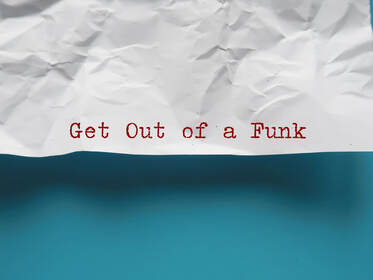 Are you feeling stuck and yearning for something more? It's time to embrace the transformative power within you to break free from the rut and create a life that is uniquely yours. Remember, you have the strength and courage to overcome any obstacle. Let me guide you on a journey to tap into your inner light, overcome the limitations holding you back, and rise above the rut.
Breaking free from the rut is a deeply personal and transformative journey, but you don't have to face it alone. Remember that you are a powerful, capable, and deserving individual. Embrace your inner light, trust the process, and rise above the rut to create a life that is a true reflection of your unique spirit. 3/11/2022 0 Comments Success by Design – How to Achieve Exceptional Results through Micro-ManagementJanuary 1st – New Year’s Resolution
January 2nd – “Nothing can stop me.” Fast forward – March 1st – stopped sticking to the plan. March 31st – Resolution dropped. Sound familiar? If so, you have probably heard something like this, “You didn’t set a realistic goal.” That’s a bunch of hogwash! Just because you did not follow through does not mean that the goal was unrealistic. If you wanted to lose 25 pounds but stopped working out and eating right, was losing 25 pounds unrealistic? No. What was unrealistic was how you went about achieving your goal. “When it is obvious that the goals cannot be reached, don’t adjust the goals, adjust the action steps.” Confucius. Losing weight is WHAT you want to accomplish. That is your goal. HOW you are going to accomplish what you want to achieve is in the STEPS. The steps you take are the most important component of your success and must be customized to design success into the process. Success is designed by breaking things down into their simplest form. Each step that we take is a single decision and it is each decision that makes the difference between results and failure. Results are a culmination of small, individual decisions. For example, you may believe that cutting out chocolate from your diet will help you eliminate your unwanted weight. There may be merit to what you have identified, but if you are a person who cannot dream of going a day, much less a week, month, or more without chocolate, how long do you think you can hold out? This is where customizing the steps necessary to achieve your goals comes in. Everything must be broken down into micro components, small decisions, which must be specific to us and designed on how we operate. If you cannot live without chocolate and know that you will cave, why not factor that in and customize a diet that includes chocolate? You know you will cave anyway, so why not just design in success and save yourself the inner-struggle. Keep in mind that progress is progress. If you are going to cheat on your diet and give up because you cave-in and have chocolate, then your progress is brought to a halt. If you add chocolate into what you can have, you can make other adjustments to accommodate caloric intake from chocolate. Our success boils down to every single decision that we make. This is where self-love plays a role. When we break things down into manageable, micro decisions, losing weight, breaking a habit, starting a new habit, or completing a project at work, ANY goal, is simplified and we are much kinder to ourselves. We need to first stop thinking of losing 25 pounds as “losing 25 pounds”, and start looking at every decision that makes up every individual step along the way. Actually putting thought into simple things like choosing not to add an extra scoop of sugar or creamer to your coffee to sitting on the couch for 20 minutes can change your goal achievement. Focus on the micro decisions. Your power is in every micro decision because these contribute to success with the main goal. Every decision we make impacts our achievement so it takes a higher level of consciousness, paying attention to what we are deciding to do; IMPACTING RESULTS. If you already know that chocolate is a ‘must have’, acknowledge that understanding and make a conscious decision that chocolate can be a deal breaker. It is where the decision to stick to the diet or not becomes black and white. Being kind to yourself is acceptance of how you think about this, not trying to overpower it – at least initially. Go ahead and choose to have a small morsel of chocolate following lunch, dinner, or both. I am not saying eat a Snickers with every meal but I am saying that the other small decisions will be much easier to make healthier choices if you do not ignore this big decision – “Do I have chocolate or not?” This is a struggle that when you begin to tackle by accepting as a deal breaker and including in your plan, eliminates the struggle. The small amount of calories that are added can be adjusted elsewhere in another food or exercise choice – yes, another decision. Stop looking at all or nothing and instead micro-manage your decisions until healthier choices overtake the unhealthy ones. The problem is that we focus on the wrong thing. Keep the end goal in sight, but focus on the individual decisions that are going to get you to the goal. When we say, “I need to exercise,” it is like trying to eat an entire elephant at once. The steps are not laid out, and instead lumped together. “I need to exercise”, does not specify, HOW. What steps are necessary to exercise? Well, first, you probably will have to choose what you are NOT going to do at that moment, and instead DO. When you go to flop down on the couch and grab the remote, why not instead make a decision to grab your walking shoes? You can then decide to walk out the door and around the block. How about after the first lap, you decide to do another. Grabbing your walking shoes is a step in the right direction and IS progress! Keep the progress going because progress begets progress. This is because we get a burst of dopamine, our body’s pleasure hormone, when we achieve. Seriously, applaud yourself for lacing your sneakers. Goal achieved! That was an easy win, onto the next! Get your butt out the door. Now one-step at a time, get walking, cycling, or whatever exercise you decide (that darned decision thing keeps popping up). This process is no different if you want to learn a foreign language, read a book a month, or study for a professional exam. You simply need to lay out the steps needed and DECIDE one micro decision at a time, what you are going to choose to do in place of another decision. If you are studying for an exam and you know that you cannot focus for more than 10 minutes at a time, do not plan to study for more than 10 minutes. Stop, shift gears, do something else, and then come back for another burst. In 10 minutes, you have made 10 minutes more progress studying than you would if you never started. If you lose 1 pound every 2 weeks by adjusting the micro decisions related to the steps that you take with your diet and exercise routine, (which also includes chocolate, because you can’t live without chocolate), than you are 1 pound closer to your goal. At that rate, at the end of a year, you will have successfully lost the 25 pounds through micro adjustments to your decisions – and you still ate chocolate! The problem with sticking to our goals has little to do with having no willpower, but everything to do with the steps we take in achieving our goals. Specifically, we need to break down each step into its smallest form and consider each micro decision associated with each step, while being real about who we are. Success is by design and you cannot design your success without factoring in YOU. Design it, decide to do it, and relish in the success of it. “The secret to getting ahead is getting started.” Mark Twain. Well, for a fleeting moment, I considered it! You know, that moment when the morning alarm goes off and the urge to push snooze, set another alarm, or just ignore it all together crosses your mind.
Oh, how I wanted to do any of the above! Just 10 more minutes, 30 more minutes, or best yet, NO alarm! Glorious! A question that I always get from friends, family, and clients is, “How do you find the time to do everything that you do?” Well, contrary to popular belief, I have not mastered time travel (not even close) nor have I figured out how to add time to the day (again, bummer). But, I definitely can share with you how to maximize the time that you have so that you can feel more in control of your day, your time, and what you need to or desire to get done! Last time I checked, there is, was, and always will be 24 hours in a day. I know this is going to come as a shocker, but you can’t make time and you can’t find it. What you can do is maximize the value that you assign to your time. Jim Rohn put it this way, “Time is more valuable than money. You can get more money, but you can’t get more time.” Let me introduce this to you. If you value it, you will protect it. I totally, could have hit the snooze this morning. I’ve done it before (lots). And I must admit, I LOVE the snooze button. I’ve also gotten pretty adept at resetting the alarm and falling right back to sleep too! In fact, I’d consider myself a pro! Unfortunately, I knew that if I hit the button that I would not get back the time, and I would regret it. Instead I chose to value that precious little “extra” time; that truly wasn’t extra at all. You see, we tend to look at time as if it expands and contracts; that we can stretch out our day or that we can get or find extra time – but we can’t! But we CAN protect the limited time we have – and yes, our time is limited in so many ways! Think about it. We only have 24 hours in a day. We have obligations that take our time. Heck, just living takes time. We have to eat, sleep, take care of ourselves, work, and the list goes on. To make matters worse, we have limited time on this planet and there is no guarantee how long that will be. So we have to make the time that we do have, while we have it, count. I know I have driven this point home enough – bear with me. Our time is limited, precious, and a valuable commodity. You can’t get it back and you can’t make more of it – so how exactly do we maximize it? By valuing it. Just the same as managing a financial portfolio, maximizing your time is done by placing a high value on each item in your time portfolio and making careful decisions where investments are made. I had to DECIDE that setting my alarm 30 minutes earlier would be valuable to me. I believed when I set the alarm last night that an “extra” 30 minutes in my day would help me knock a few things off my “to do” list before moving into the rest of my day. But DECIDING alone isn’t going to get you anywhere. Again, remember, I’m really good at “re-deciding” when the alarm goes off to reset the alarm. How many of you have DECIDED to go on a diet and then a few days in DECIDED to eat something that wasn’t part of the plan? How about a New Year’s resolution? What happened to that decision? Did you hit snooze? DECIDING is only Part I. DOING, ACTING, FOLLOWING THROUGH is the most important part because this is where value comes in. By selecting the amount of time that you choose to invest in and then actually investing in that time, you will feel like a million bucks. You won’t regret “finding the time.” Instead, you will relish in the euphoric feeling of accomplishment. Heck! You just created time! Or, so it will seem to the mere mortals around you. “How do you find all the extra time?” they will ask. To which you can sound super philosophical and whip out a quote from William Penn, “Time is what we want most, but we use worst.” Okay, you don’t have to give a flip response, but now that I have planted that brain worm (you are welcome), you can just smile and offer real wisdom. You might say something like this: “I DECIDED and then followed through, investing in by protecting, specific portions of my time….and my investment keeps paying me dividends. I now feel like I have more time – even though I still have just 24 hours in a day. I’m maximizing the time that I have by valuing my limited commodity. I’m not creating more time, I’m just using what I have more wisely. And I FEEL GREAT!” Now that you have an idea of how to place value on your time by protecting it, you can begin to see how you can get more done. Remember, just like saving money, it all adds up. In my next article I will share with you my time management success formula. This is my proven approach to take advantage of peak brain performance time and optimize outcomes! Stay tuned! 12/29/2018 0 Comments Patience is a Learned HabitYou’ve been working towards a dream, you’ve set goals and implemented your action plans, and then there is that crazy time – the wait. Waiting for that dream or goal to come to fruition can be so darned hard. Why is waiting so difficult? Because waiting is defined as the action of staying where one is or delaying action until a particular time or until something else happens. It can be uncomfortable and that is where patience comes in.
For me, 2018 has been a wild ride, with so many crazy twists and turns; it has been exciting and exhausting at the same time, and I must admit that patience is the area in my life that I must continually force self-improvement. I’m a go, go, go-type of person so staying put when I know exactly where I want to go is really difficult. There is something that I must remind myself, and that is that patience is not about waiting, but the ability to keep a good attitude while waiting. Be patient and remember that some things take time. Another thing to understand is that patience creates results. Patience is not about doing nothing, it’s about constantly doing everything that you can as you wait. No great thing is created suddenly. Patience is an action that we take, which transforms wait-time into manifested desires. It’s a time where we exercise our power to create the results that we want. Patience is about being kind to yourself, even when circumstances are out of your control. Being kind to oneself can be the toughest part of waiting for anything because we can allow ourselves to come up with so many negative “what-ifs” that we can drive ourselves crazy. Our thoughts go into auto-pilot as new thoughts are born from other thoughts like bunnies reproducing out of control. All of a sudden we realize that we are being overrun by thoughts that aren’t serving us. When we introduce patience into our thinking patterns, we introduce thoughts of “It’s going to be okay, because I say it’s okay.” And let me let you in on a little secret, even if the circumstances aren’t okay, you can be okay – you get to decide that you are okay, despite circumstances. Patience is a calming influence wherein you accept where you currently are as you actively prepare for the future state that you desire, and being okay in that place. Like everything, practice makes things much easier, and patience is no exception. The first thought to introduce to practice patience is choosing happiness now. Your thought will sound something like this: “I am looking forward to what I desire, but I choose to not let happiness in this moment become a lost opportunity. I’m choosing to be happy now, right where I am.” We can get so caught up in thinking of the future that we lose our joy today. Choose to be joyful to introduce patience – let me tell you, it makes the waiting period so much easier. Inviting in and exercising a joyful feeling will help to replace uncomfortable feelings of waiting. The next thought to introduce to yourself to practice patience is that slowing down creates thorough results. In your joyful place, slowing your thoughts down by focusing on the details needed to bring forth results can actually create more time for you to manifest your desires. Slowing down chaotic, auto-pilot thinking that tends to focus on what can go wrong and focusing instead on what you can control will allow you to develop well-thought out plans to execute. This will also allow you to think before you speak and think before you act. Imagine patience as a knob that you are turning down the speed of the activities around you to chill mode. You have the control to slow things down, just by turning the knob. Patience is an act of self-care and love as it protects you from rushing ahead without thinking things through. It is a channel for peace and joy and it is 100% within your control. These two new thoughts will help you to practice patience, but there is one critical piece that I have purposively left out for last, but it’s actually the beginning – and that is the connector – your breath. Patience begins with a breath. Slowly take in a deep breath and slowly and completely let it out. This is the initiation phase of patience as it is a conscious act of controlling that very thing that you need to sustain life – breath. Once you have taken the initial cleansing breath in and out, with your second breath choose your new thought to be happy during the wait. Breathe in and out as you process this thought. Finally, take in the third cleansing breath is your control panel breath – turn the knob down to chill – it’s time to slow down. Patience is practiced. All things are difficult before they become easy. But think of it this way, you’ve been breathing all of your life; you have mastered that! Breathe in your new peace. Breathe in your control. Breathe in patience. 12/22/2018 0 Comments Attracting What and WHOM You DesireHave you ever met someone that was just so uber cool and they just had a vibe about them that you thought, “man, I wish I were that cool”? Is it that these people are cooler than average? Or could it be that their vibration is just more compatible with more people?
Simply put, everything is energy and vibrational energy is everywhere. These super cool people are really no different than you and I or the air we breathe – we are all energy! If you are picking up that uber cool vibe from someone else, that feeling comes from inside of you, from the energy that you are exuding. Like attracts like, especially when it comes to similar energies. What you admire about that person and what attracts you to that person is the same energy that you have inside of you – you may not have the same manner of delivery as the uber cool person, but you still have that same vibe, it’s just at another level, but what they have is what you are naturally attracted to. We are attracted to vibrations, not people. When we try to contradict this we typically end up disappointed or disenchanted. Think of a person that you thought was incredibly attractive, or that you thought, “this is the one!” But once you went on a date or got to know this person, you just didn’t feel it, or they were a complete jerk. When we feel it, that it, is the vibrational energy that matches. If you consistently attract jerks and losers into your life, you may be tone deaf, and need a bit of help tuning up. Think of a tuning fork. It puts out a tone and you adjust your instrument or voice to align with the tone. Our energies are the same. You may be sending out the wrong tone or tuning out the tone all together, and thus attracting the jerk. To send out and attract better vibrations, we must do two things – 1) look inside and 2) receive feedback. Take a Deeper Look Looking inside to understand the vibrations that you are sending out is key to your healthy vibrational energy. Just because you are attracting jerks doesn’t mean that you are a jerk or sending out jerky vibes. What it means is that you and the energies of the jerk have something in common. Feelings of low self-esteem, unworthiness, or fears are all negative energies, that quite likely, even the most cocky and arrogant jerk may harbor. If you are harboring these too, guess what? Like attracts like! This is why it is so important to re-engineer our thoughts away from thoughts that aren’t serving us, and to thoughts that make us feel good. I’m thinking of good vibrations! Hey, the Beach Boys were on to something! A great meditation exercise is to quietly sit for 3-5 minutes on the floor (this helps ground your energy) in a cross-legged position with your eyes closed. To begin, take a few deep cleansing breaths. In through the nose, out through your mouth. From here, rather than emptying your mind completely, you are filling it with thoughts of good feelings about yourself. And if all you can think of are things like “I can’t even think of anything good to think,” simply think, “I’m actually sitting here filling myself up with good.” You just complemented yourself. Think as many positive thoughts about yourself, turning anything that you are working on to improve of yourself into a complement or affirmation (i.e. I’m working on becoming a pro at attracting what I want). This exercise will increase your vibration. Why? Just think of Eeyore from Winnie the Pooh. When Eeyore talks, you can literally feel the energy slow. It’s a downer. When Tigger talks, WOOHOO! You have higher energy. Positive energy vibrates faster than negative, so by increasing the energy of your thoughts, you are increasing the vibrational energy that you put out, and you will attract different energy. Meditating and cogitating positive, good thoughts is a great energy booster! Luck is not all about being in the right place at the right time – it’s all about energy and attracting like energy. Gaining Insight from Others Just like you know, who not to ask for an opinion on a good movie to see or restaurant suggestion, not everyone is equally-yoked to give you feedback about yourself. Feedback from someone close to you, however, is really important if you are tone deaf to the tuning fork for your energy. If you are tuning out, because of inner conflict, depression, self-depreciation, or low-self-esteem, someone close to you can tell you what they see about you. Ask the person to be completely honest and ask how they see you on a scale of 1-10 in the areas of confidence, happiness, and courage – 1 equaling low and 10 equaling high. Ask why they scored you in each of these areas the way that they did. Pay particular attention from a 6 and below. This means that you are manifesting (acting out) lower energy characteristics. Anything below a 10 become your complementing thoughts during meditation and any 10s become your confidence thoughts of energy during meditation – these are your “I am” statements. An I am statement is something that you believe about yourself. Typically, when someone rates you a 10 in an area, you will readily accept that belief. “I am super confident because so and so told me so and that feels good!” The most important part is not to become defensive. Instead, take it in and think about how they view you. There may be something that they see that you don’t. Defensiveness is just looking for an excuse to not address what is being said. What they say is their perception. It’s true for them, but may not be true for you. Consider it, especially if it’s not a 10. They may have helped you identify an improvement area! You need lots and lots of these good feelings to increase your energy and attract what you want. And that uber cool person? Well, delivery is a totally different topic, but what you can immediately embrace is that what attracts you to that uber cool person is EXACTLY the energy that you desire and matches your natural energetic state! Awesome news right?! Who knows, to someone else you may be that uber cool person? Keep working on those good vibrations! Namaste! Doesn’t it seem like no matter how much you THINK that you have something planned out as to how it should work that something out of the blue pops up? Something totally random?
I mean think about it; You have a plan and you are laser focused on what it is that you want, and then all of a sudden an opportunity arises that you would have never imagined would happen. What do you do? Sometimes the best moments are the moments that are unplanned, and they test our flexibility and challenge our faith and creativity in the realm of infinite possibilities. Remaining open to the unplanned and flexible enough to become aware that sometimes as we are planning, we can’t see all the options and opportunities that exist. When we remain open and are willing to accept unexpected opportunities, crazy results can happen. Success isn’t a result spontaneous combustion; You must set yourself on fire, igniting your passion to live the life that you desire and achieve the successful outcomes that you seek. We curate our success through our dreams and our imagination. When we have a definitive path, and we firmly believe that is the ONLY way, we cut ourselves short from what . The best may indeed be yet to come, but if you don’t allow in options, through spontaneity and an open mind, you may walk right past the door that leads you to wonderment. Don’t ever lose your sense of wonder. What if you would have said yes, when you said no, or said no when you said yes? What if you had taken that chance? What if you had just said, “What they heck, why not?” Spontaneity is the golden key to your creative mind. When was the last time that you did something for the first time? You have no clue what you are doing, and you learn and grow through experience along the way. You are curating new understanding of new paths and opportunities, with each and every new experience. You don’t know what you don’t know. Once we believe in ourselves, we can risk curiosity, wonder, spontaneous delight, or any experience that yields the sheer awesomeness of the human spirit. If you are always trying to be ‘normal’ and always trying to ‘play it safe’, you will never know just how amazing you can be. Live the life of your dreams – be spontaneous – dreams do come true. Have you ever felt so excited over something that you thought that you were going to explode? A time where you had an overwhelming feeling of being ecstatic, happy, and joyful, and you just could hardly contain your excitement? It’s an energy that makes you feel like anything is possible and you are supercharged to make things happen!
Why is it that we can’t seem to sustain that level of excitement, that super-charge? And how do we tap in to it so that we can maintain its motivating and creative energy? It all begins with a question – WHY? Think about a time that you were super excited. Get a good solid picture in your head and ask yourself why were you excited about the situation in the first place? Where did the excitement come from? Was it something that you longed for but never truly believed that it would come to fruition? Or perhaps, it was something that you had worked towards and it finally became your reality? The motivation for your excitement isn’t nearly as important as understanding more about what drives your excitement - understanding how you tick. If you’re not excited about it, it’s not the right path – Abraham Hicks. Some folks are naturally more pessimistic due to their environmental influences from the womb and beyond and other personality traits, whereas others seem to be marching down a happy path 99% of the time. Regardless, your natural inclination towards excitement, there are 5 steps that can help you generate your own excited energy so that you can increase your joy, motivation, and creative energy. Expand upon your own sensitivity. Feelings are not taboo. Increase your self-awareness around the joy that you are experiencing from everything that you do. You may just need an attitude adjustment through gratitude and purpose. When we understand how we currently feel about a project that we are working on or a goal, we can create better feelings if the ones that we are having aren’t serving us. We must become aware of these feelings so that we can change how we are thinking about our current situation. If you are bored, but ultimately would be excited when you finish, think about how cool it’s going to be when you finish. Imagine that feeling. Be thankful that you are on this journey. Gratitude within the process can do incredible things for unleashing joy and creativity. With your excitement and gratitude toward your desired outcome in mind, begin to curate ideas that would take your project or goal to a whole greater level. Take it up a notch. How does that feel? Just by shifting how you are viewing and feeling about that goal or project now will change your trajectory and your new feelings. Find excitement in the future and get excited today about what that excitement is going to feel like. Ground your excited energy through bold, inspired action. Your new attitude is going to be the master key to your creative energy. But like any energy source, it needs grounding so as not to short out or cause damage. Take that new-found excitement as you think about your future excitement and begin curating ideas to speed up or enhance the process. Take bold and inspired action through your excitement. It’s contagious. Ignore the temptation of the influence of praise and nay-sayers. It seems like you would definitely want to be hearing praise when you are working toward a goal and ignore the Debbie-downers, but actually both can be detrimental. If we believe that we need the energy of others to pump us up, we will equally believe that others can bring us down – not true! We get to decide how we feel, so reducing the significance of other’s opinions is important. Sure, feedback can help us improve and grow, and it’s necessary, but our belief that others make us feel anything is a whole different story! We are in charge of our feelings, because we are in charge of the thoughts that cause the feelings in the first place. Understanding and embracing this concept will help you shift to more positive energy quicker than anything! Understand your most creative time. Look, it’s hard for me to get excited before I’ve had a cup of coffee, and I’m a total morning person. I’m super creative early in the day. Understand your natural creative or energy cycle -when is your “power” time? It’s easiest to tap into how you are feeling towards something and re-ignite your excitement and to take bold and inspired actions when you are at your highest energy. Get to know it, and use it to your advantage. Didn’t you know that you have super powers?! Clear the decks. Nothing can crush your mood, your energy, your motivation, and your creativity like clutter. Mental and physical clutter can block you from flowing in the energy that you need to be in to be performing optimally. If you have a bunch of small tasks that are a money on your back – get them done! I can guarantee you that just by getting those nagging tasks out of the way, you will already begin to feel better. Worry is a form of mental clutter and we can equally deal with that, just like those nagging tasks. What are you worried about? Maybe it’s not finishing your project in time. Maybe it’s not having enough money to complete the project. Either way – you can choose to focus on a problem that isn’t a reality, or you can choose to focus on the reality – the project (or goal) is currently in process. Fear and worry are focuses on something that hasn’t transpired. Shifting our focus to what is transpiring, our current situation and reality of creating our future, puts us into solution mode; from this position we can make stuff happen, find motivation, ideas, and excitement! Think of this – Some of the best moments of your life haven’t even happened yet. Don’t let the fear of failing be greater than the excitement of achieving. Stop worrying so much about what can go wrong, and get excited about what can go right. You get to shift! Switch on excitement and unleash your full potential! |
AuthorJolene holds Doctorate of Management in Organizational Leadership and is a certified master success coach. Jolene's writing is continually inspired by the challenges that her clients are facing. She finds constant inspiration in the world around her and is profoundly honored to be living her purpose helping others turn impossible into possible. Archives
March 2024
|
HoursM-F: 5am - 9pm PST
|
AddressP.O. Box 7494
Chico, CA 95927 |
Telephone951-492-9497
|
|
